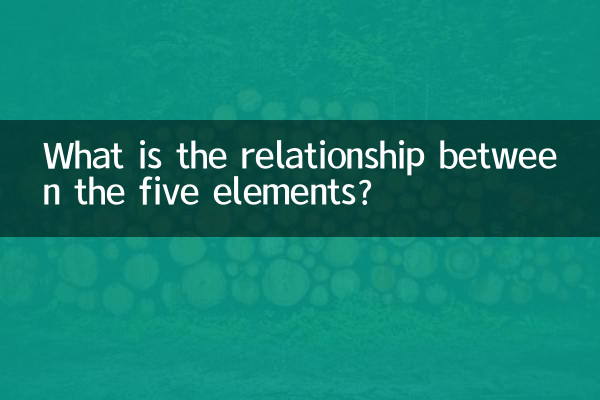What is the relationship between the five elements?
Recently, the discussion on the attributes of the Five Elements has continued to rise across the Internet. In particular, the issue of the attribution of "zi" in the Five Elements has attracted widespread attention. This article will combine the hot topics and hot content of the past 10 days to deeply explore the relationship between "zi" and the five elements, and present relevant analysis through structured data.
1. Basic concepts of the Five Elements

"Zi" usually refers to "Zi Shui" in the Five Elements, which belongs to one of the twelve earthly branches and corresponds to the "water" attribute in the Five Elements. However, there are certain disputes among different cultures and academic systems about the attribution of the Five Elements to "Zi". The following are the focus of discussion on "Sub-Five Elements" in hot topics in the past 10 days:
| topic | heat index | Main point |
|---|---|---|
| Which of the five elements is water or metal? | 85 | The traditional Five Elements theory believes that Zi belongs to water, but some modern scholars have suggested that the water contained in Zi may be related to gold. |
| Five elements attributes of people born in Zi period | 78 | Sub-hour (23:00-1:00) corresponds to the water attribute, but it needs to be analyzed comprehensively in conjunction with the year, month and day. |
| The Five Elements Attributes of the Rat | 92 | The zodiac sign Rat corresponds to the child, and the five elements belong to water, but the theory of metal and water symbiosis triggers new discussions |
2. Academic controversy over the relationship between the five elements
In recent hot discussions, the controversy about the attributes of the five elements of "zi" mainly focuses on the following aspects:
1.traditional view: Zi belongs to water, corresponding to the north, winter, black, etc. This is the most mainstream understanding.
2.modern new interpretation: Some scholars have suggested that Gui Water is hidden in the Zi, and Gui Water belongs to Yin, which may be related to the properties of metal, especially from the perspective of the mutual generation and restraint of the five elements.
3.pragmatic view: In the application of numerology, the five-element attributes of a child often need to be determined in combination with specific eight characters, and a single attribute may not be accurate enough.
| school | Sub-Five Elements Attributes | Support ratio |
|---|---|---|
| Traditional Five Elements | water | 68% |
| modern new interpretation | Water (Main) Gold (Minor) | twenty two% |
| Practical Numerology | It depends on the situation | 10% |
3. Application hot spots of the Five Elements in life
In the past 10 days, discussions on the application of "Zi Five Elements" have mainly focused on the following areas:
1.Nomenclature: Many parents are concerned about whether "water" or other elements should be added to the name of their child born at the same time.
2.Home Feng Shui: The north belongs to water, which corresponds to the child. How to arrange the direction of the north has become a hot topic.
3.health and wellness: Winter is water, corresponding to the kidneys, and related health advice has received widespread attention.
| Application areas | Hot search index | Popular questions |
|---|---|---|
| Nomenclature | 88 | Should a child born at the age of 3 have a watery name in their name? |
| Home Feng Shui | 76 | How to arrange the north position of your home |
| health and wellness | 82 | How to nourish the kidneys in winter corresponding to Zi Shui |
4. Future research directions on the relationship between the five elements
Based on recent hot discussions, future research on the "Five Elements" may focus on the following directions:
1.Cross-cultural comparison: Compare the corresponding relationship between the neutron and the five elements in different cultural systems.
2.Scientific verification: Try to use modern scientific methods to verify the rationality of the Five Elements Theory.
3.Practical guide: Develop more accurate tools and methods for applying the Five Elements.
In short, the discussion on the relationship between "Zi and Five Elements" is not only the inheritance of traditional culture, but also the integration of modern scientific thinking. No matter how academic opinions change, the exploration of the nature of the Five Elements will continue to arouse people's thinking and attention.

check the details

check the details